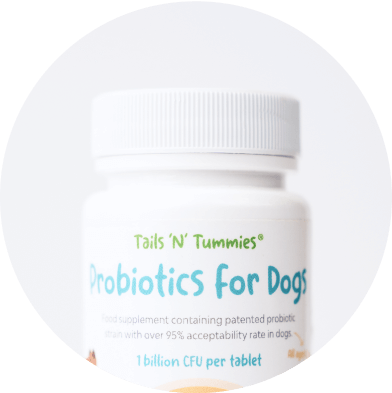Heartworm in Dogs: Symptoms, Causes, and Treatment
Heartworm disease is a serious condition that affects approximately 100,000 dogs in the United States each year. And because it’s spread by mosquitoes, no dog is safe from exposure. In this blog post, we’re going to learn all about heartworms in dogs - including how to keep your own dog safe from this dangerous disease

Heartworm disease is a dangerous type of parasitic infection spread by mosquitos that affects millions of dogs every year across the globe. Though a preventable condition, heartworm disease can be fatal if left untreated.
This blog post will tackle the basics of heartworm disease - what it is, who’s at risk, and how it spreads. We’ll also cover the tell-tale signs and symptoms of heartworm disease in dogs before taking a closer look at the helpful things an owner can do to keep this condition at bay.
What is Heartworm Disease in Dogs?
Heartworm disease is a serious and potentially fatal parasitic infection caused by the parasite Dirofilaria immitis. These parasites, which are transmitted by mosquitoes, livein the heart, lungs, and associated blood vessels of affected pets. Once inside the body, heartworms cause pain and inflammation, leading to much more serious problems if left untreated, such as heart failure, lung disease, and other complications.
How Do Dogs Get Heartworms?
Heartworms are transmitted from one infected pet to another by mosquitos, and all it takes is one bite! But house pets aren’t the only animals at risk for heartworm disease - it can also be contracted and transmitted by indigenous wildlife, such as coyotes, foxes, and wolves.
There are over seventy different species of mosquitoes that are responsible for carrying heartworms from one host to another. And while warm-weather states such as Georgia or Alabama typically report more cases per year than cold-weather states, heartworm disease has impacted pets in every state across America.
Once inside the body, heartworms have the potential to live between five and seven years and can grow up to twelve inches in length - but they don’t start out that way. In fact, heartworms begin the first stage of their life cycle as a much smaller, less-threatening organism known as microfilaria.
The Four Stages of a Heartworm’s Life Cycle
The heartworm life cycle is an intricate process that is essential to understand if you have a dog at risk. This information is commonly broken down into four separate stages:
Stage 1
The process begins when a mosquito bites into an infected animal and ingests the Dirofilaria Immitis parasite. At this stage, the parasite is in its most adolescent form and is referred to as microfilaria.
Stage 2
The second stage is commonly referred to as the “transformative” stage. During this time, the parasite grows into an infectious organism labeled “larvae” - a process that occurs within the body of the mosquito and that typically takes between ten and fourteen days.
Stage 3
During stage three, the mosquito (now carrying infectious larvae) will bite into a healthy dog. The larvae will then make their way into their new host’s bloodstream, traveling through the heart and lungs as they mature while continuing to grow larger in size along the way.
Stage 4
As the heartworms reach their adult stage, they infiltrate the heart and begin to form mated pairs within their new “home,” starting the cycle all over again. Adult heartworms can live within the body for up to seven years and can grow up to twelve inches in length!
Heartworm Prevention in Dogs
As you can see, heartworm disease is a complex, dangerous, stomach-turning process that you do NOT want your own dog to face. Fortunately, it is also preventable.
Medications for Heartworm Prevention
The easiest, most cost-effective way to prevent heartworm disease is through the regular use of preventative medications prescribed by your veterinarian. Most of these medications are administered orally and are flavored to taste just like your pup’s favorite treat!
Some of the most popular oral medications for heartworm prevention include the following:
- Heartgard
- Simparica Trio
- Trifexis
- Interceptor Plus
- Simparica
In addition, there are also a variety of topical options for heartworm prevention. These medications can be applied directly to the skin and are a great alternative for picky-eaters who may not tolerate oral medication.
The two most popular topical medications for heartworm prevention are:
- Revolution
- Advantage Multi
In addition to these great oral and topical medications, there is also an injectable heartworm preventative available called ProHeart. ProHeart is an injection administered by your vet that lasts for six to twelve months at a time and is a great option for owners who may not remember to give a monthly medication or simply don’t have the time.
What Are the Signs of Heartworms in Dogs?
Because heartworm disease is such a slow-progressing condition, an infected dog can be asymptomatic for several months (if not years) following transmission of the disease. And when a dog finally does begin to develop symptoms, they are often so subtle that they can easily be attributed to other, more common causes.
The Four Classes of Heartworm Disease
To better understand the varying stages of heartworm disease and the symptoms associated with each, experts have established four separate classes. As a rule of thumb, the higher the class, the worse the disease and the more obvious the symptoms.
Class One
A dog with class one heartworm disease will be asymptomatic or will show very mild symptoms such as an occasional cough.
Class Two
A dog with class two heartworm disease will show very mild symptoms, such as an occasional cough and tiredness after moderate activity.
Class Three
A dog with class three heartworm disease will show more severe, obvious symptoms such as a persistent cough, a sickly appearance, and tiredness after even the mildest activity. Dogs with this class of disease may also have trouble breathing or signs of heart failure. It is at this stage that changes to the heart and lungs can be visualized on x-rays.
Class Four
Dogs with class four heartworm disease will show very obvious, severe symptoms that are often referred to as Caval Syndrome. Caval Syndrome is a serious, life-threatening condition that occurs when worms become so numerous they physically obstruct the flow of blood back to the heart. Not only is surgery needed for treatment, but it's risky and may not be successful - sadly, making this a fatal diagnosis in many cases.
Aside from the physical symptoms listed within the description of these classes, a dog with heartworm disease may also experience weight loss and a decreased appetite.
Diagnosing Heartworms in Dogs
There are two primary ways to diagnose the presence of heartworms in dogs, both of which involve the use of a blood sample. The first option is an antigen test, which is designed to detect specific heartworm proteins within a dog’s blood sample. This test is nearly 100% accurate and is the go-to option for most veterinary clinics, providing fast and accurate results in a matter of minutes.
The second option for testing involves the use of a microscope, and its purpose is to examine a dog’s blood sample for microfilaria. Though a very precise testing option, this type of diagnostic will not provide accurate results unless it has been at least six months since the dog was bitten by an infectious mosquito.
In order to purchase heartworm prevention, your veterinarian will require your dog to be tested for heartworms yearly. This not only allows your veterinarian to have a clear picture of your dog’s overall health, but it will also ensure that it is safe to continue giving prevention. According to the FDA, “giving a heartworm preventive to a dog infected with adult heartworms may be harmful or deadly.”
Heartworm Treatment for Dogs
Heartworm disease is treated with a series of injections of a medication called Melarsomine Dihydrochloride. Widely recognized by the brand names Immiticide and Diroban, these injections are administered into a dog’s back muscles and are approved for treating Class 1, 2, and 3 cases of heartworm disease.
In congruence with this series of injections, a veterinarian may also prescribe an antibiotic called Doxycycline (to combat the risk of infection) along with a round of steroids (to reduce inflammation in the lungs and associated blood vessels).
While this method for treating heartworms has a high success rate, it’s important to understand that there is significant risk involved for your pet. While highly effective for killing heartworms, Melarsomine Dihydrochloride contains arsenic and has the potential to be very toxic when injected into a dog’s body.
Unfortunately, there are no comparable alternatives to this treatment regimen, though it is possible to use Advantage Multi (a topical preventative) to rid a dog’s bloodstream of microfilaria. Of course, this has no benefit for full-grown heartworms but may be beneficial in the early stages of infection.
While undergoing heartworm treatment, it is imperative for owners to fully restrict their pet’s activity. While a difficult task for the high-energy pet owner, physical exertion significantly increases the rate at which the heartworms will cause damage to a dog’s heart and lungs.
FAQs About Heartworm Disease in Dogs
“What is the prognosis for a dog with heartworm disease?”
If a pet with heartworm disease receives treatment, his prognosis is excellent - in fact, according to the Heartworm Society, heartworm treatment has a 95% success rate!Most dogs can return to normal activity within a few short months of their treatment, and will go on to live full and happy lives.
However, if a dog with heartworms does NOT receive appropriate treatment, his prognosis is very grave. While it may take several years for the heartworms to reach adulthood, they will eventually cause irreversible damage to a dog’s heart and lungs. At that point, a dog becomes ineligible for treatment and will die a slow, painful death unless humanely euthanized.
“How common is heartworm in dogs?”
Heartworm disease is a fairly common condition, affecting approximately 1 in 100 dogs in the United States each year.
“Are heartworms in dogs contagious?”
Although heartworms cannot be directly transmitted between animals, the parasites that cause the disease are spread by carrier mosquitoes. In this sense, heartworm disease is contagious.
“How can I treat heartworms in dogs at home?”
As we’ve learned, the only successful treatment option for getting rid of heartworms is a series of injections of Melarsomine Dihydrochloride,which can only be given by a licensed veterinarian. There are no home remedies for treating heartworms in dogs. However, there are certain things that pet owners can do at home to prevent the risk of heartworm disease.
Ensuring your pet receives his heartworm medication each and every month is the single best way to prevent heartworm disease. Additionally, having your pet tested routinely can help you keep a close eye on his overall health, ensuring that your chosen preventative is doing its job.
“What can I feed a dog with heartworms?”
There are no dietary restrictions for a dog with heartworm disease.
Conclusion
Heartworm disease is an intimidating, life-threatening condition that affects approximately 1 in 100 dogs in the United States each year. While treatment is available for most infected animals, it can be quite expensive and difficult for a dog to endure. That’s why the single most important thing that a pet owner can do to keep their own dog safe from heartworm disease is to be diligent in administering prevention. By doing so, you can be sure to keep your dog healthy, happy, and heartworm-free!
Boost Their Gut Health with Probiotics for Dogs
Facing digestive issues in your furry friend? Our Probiotics for Dogs is a blend aimed at enhancing gut health, boosting nutrient absorption, and promoting overall wellness. Dive into a world where your dog’s tummy troubles are eased. Your beloved companion deserves a life of comfort and vitality. Discover the benefits today.
Shop Probiotics